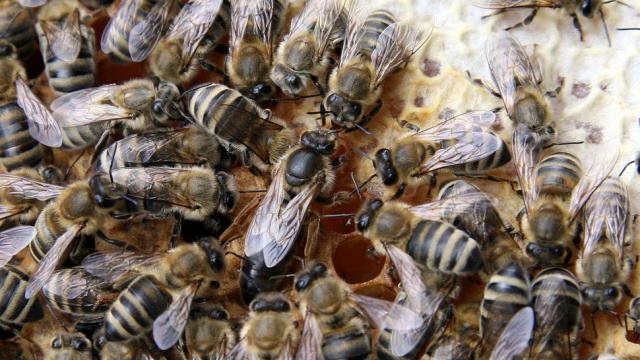New research from the University of Nebraska-Lincoln shows that a widely-used class of nicotine-based insecticides is causing queen bees to lay substantially fewer eggs than normal. This particular class of insecticides — the most popular in the world — has also been linked to colony collapse disorder, a mysterious phenomenon in which the majority of worker bees suddenly abandon the hive, leaving immature bees and the queen behind.
Previous research has shown that neonicotinoid insecticides have a detrimental effect on bees, resulting in impairments to foraging, learning, and memory in worker bees. But few studies have looked at the effects of neonicotinoids on the queen bees in particular, who are the mothers of most — if not all — bees in a beehive.
In the latest study published in Scientific Reports, lead author Judy Wu-Smart and colleagues found that queen bees in colonies who were fed a sweet syrup laced in Imidacloprid, a neonicotinoid insecticide, laid substantially fewer eggs than normal. Depending on the dose, the queens laid anywhere from one-third to two-thirds fewer eggs compared to queens in unexposed colonies.
“The queens are of particular importance because they’re the only reproductive individual laying eggs in the colony,” Wu-Smart said in a statement. “One queen can lay up to 1,000 eggs a day. If her ability to lay eggs is reduced, that is a subtle effect that isn’t (immediately) noticeable but translates to really dramatic consequences for the colony.”
With the help of Marla Spivak from the University of Minnesota, Wu-Smart evaluated colonies populated by 1,500, 3,000, and 7,000 honey bees. The control colonies received untainted syrup, while the test hives received samples with insecticide doses of 10, 20, 50, and 100 parts per billion. This was done over a three-week period, resulting in a number of adverse effects to the queens and their broods.
In addition to an impaired ability to lay eggs, the queens also exhibited poor locomotor activity. Workers experienced impairments to foraging and hygienic activities, and the colony as a whole experienced poor development overall (e.g. poor brood production and reduced pollen stores). The larger the colony, however, the lesser the effect, suggesting that larger populations act as a buffer to offset pesticide exposure.
These results are a strong indication that neonicotinoid insecticides are contributing to the global decline in bee populations. Growers typically apply insecticides or sow insecticide-treated seeds during early spring, when bees are at their most vulnerable. But Wu-Smart says that banning neonicotinoids is not the solution. Rather, she advocates for regulating insecticide-treated seeds the same way that sprays and other application techniques are regulated, and recommends that farmers be smart about when they conduct their aerial sprays (i.e. not on windy days).
“In many of these cases, we want to figure out why these colonies are dwindling when they should be at their peak production,” said We-Smart. “[Our study] is providing some of that insight. It’s not answering all the questions, but it’s definitely something to consider.”
